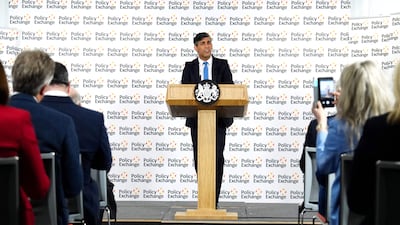Extremists are “weaponising” Islamophobia and anti-Semitism to divide and undermine British society, Rishi Sunak said in a keynote speech on Monday.
Mr Sunak warned that extremists were exploiting current global conflicts “to divide us”, in an hour-long appearance at the Conservative-supporting Policy Exchange think tank, in which he warned the UK faces “some of the most dangerous yet most transformational” years the country has known.
“People are abusing our liberal democratic values – the freedom of speech and right of protest – to intimidate, threaten and assault others,” he said. “To weaponise the evils of anti-Semitism or anti-Muslim hatred in a divisive, ideological attempt to set Briton against Briton.”
The Israel-Gaza war has already affected British elections after a large segment of the Muslim vote deserted Labour in local polls this month.
Months of large-scale pro-Palestinian protests, as well as smaller pro-Israeli demonstrations, have polarised the public in a country where nearly four million Muslims make up nearly seven per cent of the population.
Immigration weaponised
With 100 million people displaced globally, “illegal migration is placing an intolerable strain on our security and our sense of fairness”, the Prime Minister said. “Unless we act now act boldly, this problem is only going to grow,” he added.
Mr Sunak has invested huge political capital in pushing through his Rwanda deportation policy for those who arrive illegally in Britain via small boats across the English Channel.
While he had “pioneered” the Rwanda scheme that Labour has pledged to scrap should it arrive in government, Mr Sunak admitted there “may be flashpoints ahead with the ECHR”.
But he indicated he would withdraw Britain, which was a prime mover in setting up the court after the Second World War, from the convention.
“If the Strasbourg Court make me choose between the ECHR and this country’s security, I will choose our country’s security every single time,” he affirmed.
'Doom-loop Labour'
Trailing in the polls by the significant margin of 20 points, the Conservatives will need a dramatic turnaround in political fortunes to remain in government following the general election likely to take place in autumn.
Mr Sunak is developing a tactic in which he admits his party could well lose in the hope this will scare people into not voting Labour.
“Maybe they [Labour] can depress their way to victory, with all their talk of doom loops and gaslighting and scaremongering about pensions but I don't think it will work,” he said.
In questions after the speech he was asked if Britain would be “safe” under the leadership of Labour’s Keir Starmer and that the thrust of his argument was “better the devil you know”.
He admitted the Conservatives, who have had four prime ministers in five years, had got things wrong: “I'm not standing here pretending that everything's been perfect.”
But he blamed much of that on “the most difficult circumstances that any government have faced since the end of the Second World War”, adding: “I believe that we will keep this country safe and Keir Starmer’s actions demonstrate that he won't be able to do that.”
AI to the rescue
He also balanced out his own doomsday imagery of living in “one of the most dangerous periods we've ever known” with a more optimistic view in which AI would accelerate human progress like the steam engine did in the 19th century.
AI would “speed up the discovery of new ideas, assisting almost every aspect of human life” including giving children personal tutors and medical advances that could detect potential heart attacks or Parkinson’s disease with a single picture of the eyes.
“Credible estimates suggest AI alone could double our productivity in the next decade,” he added.


